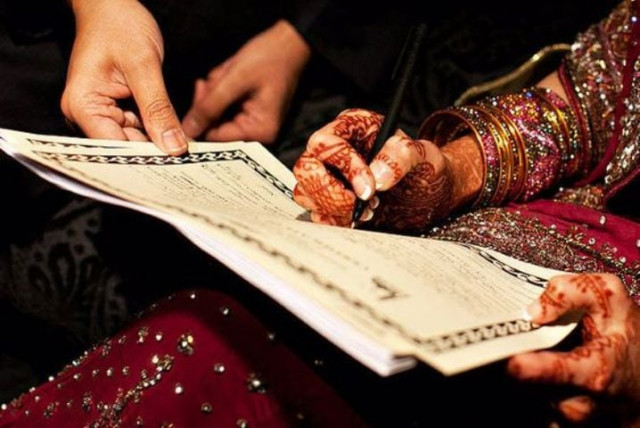As we approach a certain age (that age varying upon a variety of factors) we are faced with the prospect of marriage. It is a natural part of our lives and marriage is, at least to me, one of the very sacred bonds we share with another person. To marry someone is to promise lifelong companionship for better or for worse, in sickness and in health.
It is and should be considered as a journey you take with your significant other. Like all journeys, it must start somewhere and in the case of Muslims all over Pakistan, it starts when the man and the woman sign the nikkah nama.
The nikkah nama is a legal document and is undoubtedly the foundation of all marriages. It is a written contract that all Muslim couples must put their signature on in order to legalise their marriage. I was always familiar with the term ‘nikkah nama’ but I never looked into it.
It was very recently – when I was asked to speak about the nikkah nama on a radio show – that I felt I should familiarise myself with what it entails. And when I started reading it I realised the amount of protection it offers to Muslim women and how innocently we waive it off without a second thought.
The second realisation came after I spoke to a number of married women about their nikkah nama. I can’t say I was shocked to discover that most of them just signed the document without even taking a look at it. Some are interested in knowing what it says but end up being pressurised by their families to sign it off and not bother with the legalities.
This needs to stop.
The so-called ‘legalities’ that are waived off are rights granted to women and men by the state which provide them with the necessary protection and alternatives they need in case things do not work in their favour. I understand that no one wants to picture a red flag even before they have begun this beautiful journey, but what most of us fail to understand is that it’s only before you sign the document that you have the power to protect your rights.
Once that document is signed, like any other contract, it becomes legally binding between the man and the woman and cannot be altered. It should not be treated as anything other than how you would treat a normal contract, which is why it is essential that the man and the woman read the document fully and objectively discuss what is to be done with the different clauses.
You must be wondering what clauses I am talking about. Let’s deal with them in order.
Clause 13-16 deals with the mehr or dower. Mehr is a gift given to the wife by her husband – the amount or value of which must be agreed upon at the time of the nikkah. You must first specify the exact amount or value of the mehr and the form in which it will be given (cash, jewellery or property). You must also specify when it will be given, whether it will be given promptly (mu’ajjal) or whether it will be given at a later stage (ghair mu’wajjal). These may come across as unnecessary details but it is absolutely essential for this to be sorted out beforehand and included in the document to avoid disputes at a later stage.
Clause 17 includes any special terms and conditions put forward by the man or woman independently. So, for example, if the woman wants her husband to pay her Rs10,000 every month as maintenance, it should be put down in this clause. One may even stipulate that there will be no form of violence between the parties. A particular amount is then specified to serve as compensation in case an incident takes place. Basically, in this clause, the man and woman can put down whatever conditions they want so long as they are within the boundaries of the law. You can even specify who takes custody of the children in case there is a separation or divorce.
Clause 18 is a very important clause, which allows the man to delegate the right of ‘divorce’ (talaq-e-tafweez) to the woman. This is completely different from khula and does not affect the right of khula in any way. It allows the woman to seek talaq from her husband legally. Having this right will allow the woman to seek talaq without the need to go to court and will allow her to keep her mehr. This is a clause favourable to both the husband and wife as the husband can put conditions on the wife’s right to divorce.
Clause 19 asks if there are any conditions on the husband’s right to divorce the wife. The woman can put conditions such as financial compensation, provision of a house etc. as a restriction on the husband’s right to divorce. Through clause 20, the woman may specify the details and documentation of mehr, maintenance and financial support. This will act as proof in case there is a dispute between the husband and wife at a later stage. However, it does not mean that the woman is not entitled to more than what has been specified; it should be considered as a minimum requirement that the husband has to fulfil.
The last of these important clauses is clause 21 that includes the restrictions on the man’s right to contract further marriages while still married to his first wife. This clause states that if a man is already married then, under the Muslim Family Law Ordinance 1961, he must show that he has obtained permission from the Union Council to marry another woman. The Union Council in turn requires proof that the permission of the existing wife/wives has been obtained.
It is apparent from these clauses and their existence on the nikkah nama that these are essential rights that we all have a claim to and it is only a matter of taking the initiative of reading the document and putting down these rights in written form. It sounds and appears formal but it is there for your protection.
You must know your nikkah nama before signing it.
You should know your nikkah nama before signing it
No one wants to picture a red flag at the beginning, but you must realise you have the power to protect your rights.



COMMENTS
Comments are moderated and generally will be posted if they are on-topic and not abusive.
For more information, please see our Comments FAQ